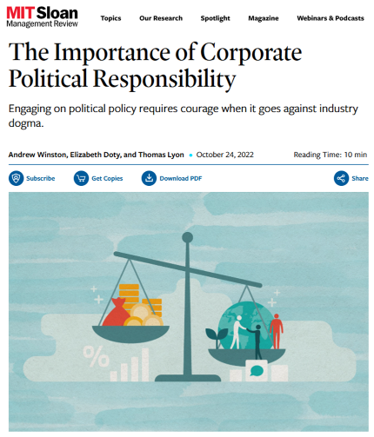Do you have a resource to recommend for The CPR Hub? Please reach out and we will review it for future updates!
Consequences and Impacts of Pro-Business Political Influence
Video 2 of 3
April 21, 2022, we spoke with Anat Admati of Stanford Graduate School of Business and Jerry Davis of the Ross School of Business at the University of Michigan to explore “Corporate Political Responsibility & the Economy: Revisiting ‘Pro-business’ Advocacy”
In the debate over whether businesses should take a stand on broad civic, political and societal issues, few have explored how companies influence policy and narratives on issues related to their core businesses and shareholder returns. As the economy, and particularly corporate governance practices, become “financialized,” ”pro-business” political influence has had a major impact on public discourse and economic outcomes.
Does the status quo truly benefit all --- or only a few --- ultimate shareholders of corporations and the economy as a whole? What is the impact on democracy, and what might true “corporate political responsibility” (CPR) look like in practice?
In this module, we explore:
- How is this a problem for shareholders? Aren’t shareholders doing well?
- How are these dynamics affecting everyday people? Are they related to the frustrations we are hearing?
- How much do these patterns have to do with distrust of capitalism and democracy?
The Corporate Political Responsibility Taskforce (CPRT)’s Expert Dialogues are in-depth, recorded conversations with academic experts, stakeholder advocates and business practitioners to provide our members and other CPR champions with the expertise and context they need to develop principled, proactive CPR strategies. We invite those interested in a constructive, non-partisan, principles-based discussion.
Anat Admati, George G.C. Parker Professor of Finance and Economics at the Stanford Graduate School of Business, Faculty Director of the Corporations and Society Initiative at Stanford University, Senior Fellow, Stanford Institute for Economic Policy Research, and author of The Bankers’ New Clothes: What’s Wrong with Banking and What to Do about It.
Jerry Davis, Gilbert and Ruth Whitaker Professor of Business Administration at the Ross School of Business, Professor of Sociology at the University of Michigan, Faculty Director of Business + Impact, and author of Taming Corporate Power in the 21st Century.
The full transcript for this module is available here.
Keywords: #CorporatePoliticalResponsibility #ESG #SystemicRisk #CPR_Transparency #CPR_Accountability #CivicInstitutions #EnterpriseRisk #Injustice


